by Gary Lord
Home - Genesis - 2007 - 2008 - 2009 - Early 2010 - Mid 2010 - Late 2010 - End 2010 - Early 2011 - Mid 2011 - Late 2011 - End 2011 - Early 2012 - Late 2012 - Early 2013- Late 2013 - 2014 - 2015 - Early 2016 - Late 2016 - 2017-19
Chapter Eight: End 2010
On 24 November 2010 the Pentagon warned the US Senate and House Armed Services Committees that WikiLeaks and its media partners were preparing to release "several hundred thousand” classified US State Department cables in the next few days. A spokeswoman called it "an irresponsible attempt to wreak havoc and destabilize global security". WikiLeaks accused the Pentagon of "hyperventilating".
The New York Times had already shared the leaked Cablegate archive with the US State Department, which was now busy preparing allied governments for the impact of the disclosures. On 26 November 2010, the US Ambassador visited 10 Downing Street in London, while Hillary Clinton briefed Australian Foreign Minister Kevin Rudd. WikiLeaks tweeted that US officials were also contacting government ministers in Canada, Denmark, Norway, Israel, Iraq, Turkey, Russia and Iceland.
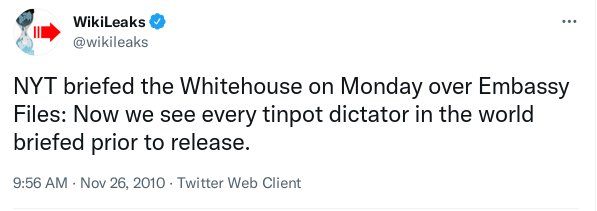
Assange was angry at the Guardian for leaking the cables to the New York Times, and angry at the Times for contacting the US State Department, but he also took the opportunity - perhaps as a protective measure - to offer the US State Department a final opportunity to specify any cables that would endanger lives. On 26 November he personally wrote to the US Ambassador in London:
Subject to the general objective of ensuring maximum disclosure of information in the public interest, WikiLeaks would be grateful for the United States Government to privately nominate any specific instances (record numbers or names) where it considers the publication of information would put individual persons at significant risk of harm that has not already been addressed. WikiLeaks will respect the confidentiality of advice provided by the United States Government and is prepared to consider any such submissions made without delay.
The private offer was publicly declined, with a US legal adviser’s response released to the media on the following day:
We will not engage in a negotiation regarding the further release or dissemination of illegally obtained U.S. Government classified materials.
A press release from the White House, just hours before the Cablegate release, insisted that the disclosures would put at risk US "diplomats, intelligence professionals, and people around the world who come to the United States for assistance in promoting democracy and open government."
President Obama supports responsible, accountable, and open government at home and around the world, but this reckless and dangerous action runs counter to that goal. By releasing stolen and classified documents, Wikileaks has put at risk not only the cause of human rights but also the lives and work of these individuals.
Assange responded by email that WikiLeaks had "absolutely no desire to put individual persons at significant risk of harm, nor do we wish to harm the national security of the United States". He lamented that the US government had rejected his offer for "constructive dialogue and chosen a confrontational approach".
I understand that the United States government would prefer not to have the information that will be published in the public domain and is not in favour of openness. That said, either there is a risk or there is not. You have chosen to respond in a manner which leads me to conclude that the supposed risks are entirely fanciful and you are instead concerned to suppress evidence of human rights abuse and other criminal behaviour. We will now proceed to release the material subject to our checks and the checks of our media partners unless you get back to me, as you promised in the call with our lawyers last Friday.
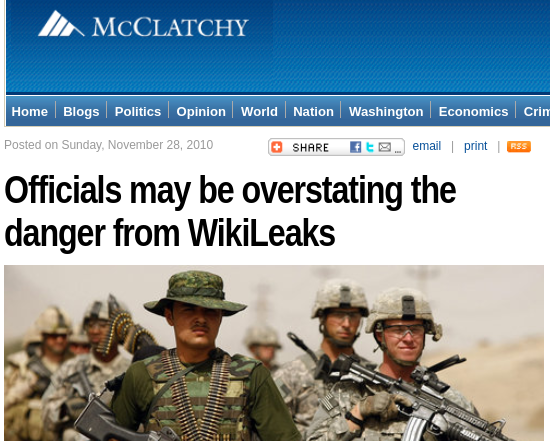
As usual, the much-hyped threats to human lives never materialised. By the time the cables were published, the US State Department had had weeks to prepare for the impact. Even allied governments were prepared.
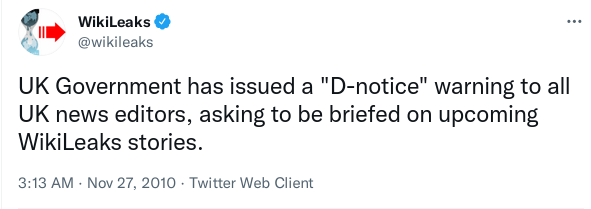
Cablegate
As over two hundred and fifty thousand documents from the US State Department began spilling into the public domain on 28 November 2010, there was no initial release from WikiLeaks, not even a press conference. The media partners posted their reports, describing explosive secrets from countries all around the world, while WikiLeaks merely published the corresponding diplomatic cables. Assange was keeping a low profile.
Articles based on the first 220 files were published by El País (Spain), Der Spiegel (Germany), Le Monde (France), The Guardian (United Kingdom) and The New York Times (United States). The material was to be published over a period of several weeks, with other global media organisations gradually involved, thus maximising impact.
After months of work, New Zealand journalist Nicky Hager was "lucky enough" to be with the WikiLeaks team at a secret location "somewhere outside London" when the first cables were released. He said he "had a feeling of being present as history was being made". Then the WikiLeaks website came under attack.
The first bundle of documents went live at 6pm British time and immediately there was a massive denial of service attack. Unknown people somewhere in the world were bombarding the WikiLeaks' websites, trying to close them down.

Everything was focused on a computer specialist who had arrived at the house to donate his time to overseeing the launch. He was obviously at the top of his profession. Everyone seemed in awe of his skills. He had prepared for the launch, typing computer code faster than most journalists can write words, apparently working straight through the night. Now he was engrossed in fending off the cyber attack: monitoring the waves of incoming traffic and identifying and blocking the attackers. The mood was tense until, after a long 30 minutes, he looked up with a little smile and said the attack seemed to be over.
WikiLeaks continued fighting off similar attacks for several days. Despite all the stress, Julian Assange was in a bouyant mood.
Working in that crowded room, he was very focused, but also good humoured and thoughtful of others. For someone at the centre of international news attention, and an international man-hunt, he seemed calm and considered, and not to be taking himself too seriously. He is clearly the central force in the organisation, but there were gutsy people working around him as well. Sometimes they sought his decisions on things and other times they bossed him around.
The leaked cables, dated from 1966 to February 2010, disclosed confidential communications between the State Department in Washington DC and 274 US embassies around the world. 15,652 of the cables were classified "secret", with another 101,748 "confidential" and 133,887 "unclassified". A WikiLeaks press release said the cables would give people around the world "an unprecedented insight into US Government foreign activities".
The cables show the extent of US spying on its allies and the UN; turning a blind eye to corruption and human rights abuse in "client states"; backroom deals with supposedly neutral countries; lobbying for US corporations; and the measures US diplomats take to advance those who have access to them.
This document release reveals the contradictions between the US’s public persona and what it says behind closed doors – and shows that if citizens in a democracy want their governments to reflect their wishes, they should ask to see what’s going on behind the scenes.
The Guardian’s first big story revealed that US Secretary of State Hillary Clinton had ordered her staff to spy on top United Nations officials, including the UN Secretary General, Ban Ki-moon, and the Permanent Security Council representatives from China, Russia, France and the UK. Washington wanted biometric data including "DNA, fingerprints and iris scans", along with "credit card numbers, email addresses, phone, fax and pager numbers and even frequent-flyer account numbers". This was a clear breach of the 1961 Vienna Convention, which covers the UN. Another cable revealed that this spying was done at the behest of the CIA. In an interview with Time magazine, Julian Assange called for Hillary Clinton to resign:
"She should resign, if it can be shown that she was responsible for ordering US diplomatic figures to engage in espionage in the United Nations, in violation of the international covenants to which the US has signed up. Yes, she should resign over that."
Assange later suggested that President Obama should also resign, if he had approved the spying.
The New York Times revealed that US and British diplomats also spied on UN Secretary General Kofi Annan in the weeks before the 2003 invasion of Iraq, which Annan declared "illegal". State Department spokesman Philip J. Crowley blithely dismissed public shock at these revelations.
"This is what diplomats, from our country and other countries, have done for hundreds of years.”
US officials claimed that most of the cables only revealed diplomats hard at work, often doing good things like putting pressure on the Saudi government to let women drive cars. As usual, the latest WikiLeaks release was simultanously "recklessly dangerous" and "putting lives at risk" but also "nothing to see here".
Citizens around the world, however, were shocked by what they discovered. For example: the USA had nuclear weapons in Denmark; European allies were ready to quit the war in Afghanistan; the USA had deliberately undermined the UN’s 2009 global climate summit in Copenhagen; the USA sought to derail delivery of subsidised Venezuelan petroleum in order to protect the business interests of US oil companies; US companies pressured the government to block an increase in Haiti’s minimum wage. In Mexico, the US ambassador resigned after a leaked cable revealed his complaints about government handling of the war on drug cartels.
In Tunisia, a cable from the US Ambassador reported that President Ben Ali and his regime had "lost touch with the Tunisian people" and were "relying on the police" to cling to power.
Corruption in the inner circle is growing. Even average Tunisians are now keenly aware of it, and the chorus of complaints is rising. Tunisians intensely dislike, even hate, first lady Leila Trabelsi and her family. In private, regime opponents mock her; even those close to the government express dismay at her reported behaviour. Meanwhile, anger is growing at Tunisia’s high unemployment and regional inequities. As a consequence, the risks to the regime’s long-term stability are increasing.
Ten days after this news was reported, a Tunisian market stall holder named Mohamed Bouazizi set himself on fire, sparking local riots that spread and eventually triggered "Arab Spring" revolutions across the Middle East. Many of the protestors cited WikiLeaks revelations as conclusive evidence of long-suspected corruption.
A blogger at The Arabist suggested that the Cablegate leaks had particular impact in the Arab world, where media criticism of the US government was seldom tolerated despite wisespread public cynicism. Pakistan, Yemen, Saudi Arabia and other Middle Eastern nations were especially impacted by the cables, with neighbouring Iraq and Afghanista among the most discussed topics.
The leaked cables lead to hundreds of stories around the world (well beyond the scope of this book) and an avalance of diplomatic fallout which continued for many years. Even a decade later, old US cables were still being produced as evidence whenever cited events, facts and public figures became newsworthy. The cables were eventually merged into WikiLeaks' searchable "Plus D" Public Library of US Diplomacy.
*
48 hours after the first Cablegate publications, Interpol issued a warrant for Julian Assange’s arrest due to "sex crimes". The timing of this shocking news, which bumped Cablegate stories off front pages around the world, raised many eyebrows.
A day earlier, US Attorney General Eric Holder had declared an “active ongoing criminal investigation into WikiLeaks”.
"Let me be clear. This is not sabre-rattling," he said, vowing to swiftly "close the gaps" in current US legislation.
Australia’s Attorney General also announced an investigation into WikiLeaks. He said Australian Federal Police were looking at "potentially a number of criminal laws that could have been breached" by the Cablegate release.
"Australia will support any law enforcement action that may be taken. The United States will be the lead government in that respect".
A document from Edward Snowden later revealed that just months earlier, in August 2010, the Obama administration had urged Australia and other foreign allies to file criminal charges against Assange over the group’s publication of the Afghanistan war logs".

"The appeal exemplifies the start of an international effort to focus the legal element of national power upon non-state actor Assange and the human network that supports WikiLeaks".
Australian Prime Minister Julia Gillard absurdly declared that the leaking of classified documents by WikiLeaks was "illegal". But her "whole of government" investigation closed within two weeks after failing to find a single law that had been broken. Gillard still lamely insisted the leaks were "grossly irresponsible".
By contrast, her Foreign Minister Kevin Rudd suggested that lax US government security was the real problem. Former Australian security and intelligence officials later admitted that US Justice Department officials had told Australia they were "determined to get Assange, but also didn’t want to make a martyr of him".
"We were all happy when he got caught up in a sexual imbroglio in Sweden," said one. "It was much better to have him facing sex crimes allegations than to argue about First Amendment freedoms in the US."
In Washington, Senator Joe Lieberman, the head of the Senate Homeland Security Committee, said disclosure of the US diplomatic cables was "nothing less than an attack on our national security". His rhetoric was typically extreme:
"Let there be no doubt: the individuals responsible are going to have blood on their hands."
Lieberman called on companies and organisations to immediately terminate their relationships with WikiLeaks.
"No responsible company - whether American or foreign - should assist WikiLeaks in its efforts to disseminate these stolen materials."
Tableau Software immediately withdrew the data visualisations that had been used to map the Iraq War Logs. More importantly, Amazon promptly refused to continue hosting WikiLeaks data on its EC2 web servers. Daniel Ellsberg was just one of many customers "disgusted by Amazon’s cowardice and servility in abruptly".
"For the last several years, I’ve been spending over $100 a month on new and used books from Amazon. That’s over. I ask Amazon to terminate immediately my membership in Amazon Prime and my Amazon credit card and account, to delete my contact and credit information from their files and to send me no more notices."

In a pathetic attempt to appease angry customers, Amazon later claimed their action was not a response to Lieberman’s call but simply enforcing their "terms and conditions" (never mind they had previously hosted the Afghan and Iraq War Logs).
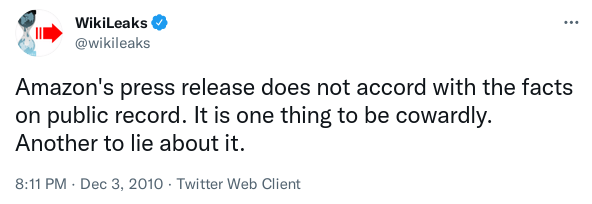
On 3 December, visitors to wikileaks.org got an error page. The domain name had been shut down by the California-base provider, everydns.net, who (also rather pathetically) claimed their other customers were being negatively impacted by repeated denial-of-service attacks. WikiLeaks told visitors to go to the Swiss mirror wise wikileaks.ch instead.

Assange called these attacks on the WikiLeaks website an example of the "privatisation of state censorship".
"These attacks will not stop our mission, but should be setting off alarm bells about the rule of law in the United States."
The attacks, however, were not limited to the USA. After WikiLeaks moved some of its digital infrastructure from Amazon servers to a French Web hosting company called OVH, the French Industry Minister Eric Besson called for WikiLeaks to be banned from French servers. His call was turned down by a French judge. The High Court of Pakistan also dismissed an attempt to ban WikiLeaks.
China blocked Internet access to WikiLeaks material, with a Foreign Ministry spokesman saying that they did not with to disturb relations with the USA. This came as the New York Times ran a story about a cable linking Chinese Communist Party chiefs with cyber-attacks on Google.
In Canada, Tom Flanagan, a former senior adviser to Prime Minister Stephen Harper, said on national television:
“I think Assange should be assassinated, actually. I think Obama should put out a contract and maybe use a drone or something.”
Julian Assange said Flanagan and the others making such dangerous statements "should be charged with incitement to commit murder.”
Meanwhile, in little-noticed news, faraway Ecuador offered Assange residency with no questions asked. Deputy Foreign Minister Kintto Lucas invited the 39-year-old Australian to come to Ecuador "so he can freely present the information he possesses".
"We are ready to give him residence in Ecuador, with no problems and no conditions."
*
Global finance companies quickly followed the efforts by Amazon and Swiss bank PostFinance to shut down WikiLeaks. Bank of America, MasterCard and Visa closed down WikiLeaks accounts or suspended donations to the organisation. PayPal also froze 60,000 euros of WikiLeaks funds that had been donated via the German charity the Wau Holland Foundation. Within a week, WikiLeaks and Julian Assange claimed to have lost 100,000 euros in assets:
One of the most fascinating aspects of the Cablegate exposure is how it is throwing into relief the power dynamics between supposedly independent states like Switzerland, Sweden and Australia. WikiLeaks also has public bank accounts in Iceland (preferred) and Germany. Please help cover our expenditures while we fight to get our assets back.
Visa then ordered DataCell, a small Icelandic company that was helping WikiLeaks collect payments, to suspend all of its transactions. The CEO of DataCell promised to fight the order:
"Visa customers are contacting us in masses to confirm that they really donate and they are not happy about Visa rejecting them. It is obvious that Visa is under political pressure to close us down."
There was an immediate massive public backlash against this borderline illegal global banking blockade, which cost WikiLeaks an estimated $250 million over the next three years.
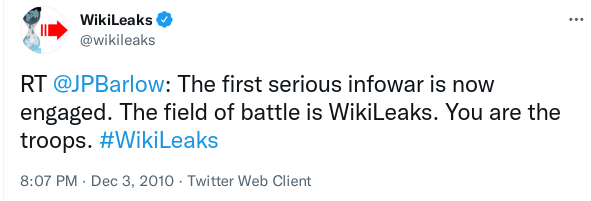
By early December 2010, WikiLeaks already had over 340,000 followers on Twitter, while Facebook fans reportedly climbed from 375,000 to over half a million in just 24 hours. Within a week of the WikiLeaks.org website shutdown, over 500 new mirror sites had appeared around the world.
A group of #Anonymous hackers had united months earlier to create a project called Operation Payback, which initially launched retaliation efforts against attacks on free torrents sites like The Pirate Bay. They now diverted their attention from pro-copyright and anti-piracy targets to launch "Operation Avenge Assange".
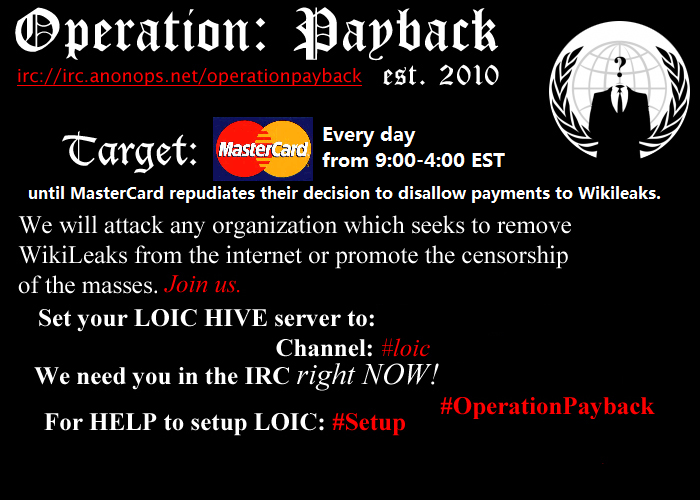
Hours after the PostFinance bank account of Julian Assange was frozen, the bank’s website was knocked offline by "distributed denial of service" (DDoS) attacks. The next day, the hackers brought down the websites of EveryDNS and the Swedish Prosecution Authority. Then the websites of Visa and Mastercard, along with the website of Senator Joe Lieberman and Swedish lawyer Claes Borgström’s legal firm. US Senator Sarah Palin was also targeted after she said Assange should be "pursued with the same urgency we pursue al-Qaeda and Taliban leaders".
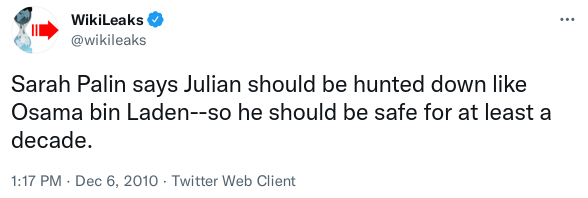
PayPal claimed that days of attacks on their website cost the company $5.5 million; they eventually agreed to release the frozen Wau Holland Foundation funds but refused to reactivate the charity’s account.
A New York Times article reported that the attacks "suggested that the loosely organized group called Anonymous might have come of age, evolving into one focused on more serious matters: in this case, the definition of Internet freedom."
The FBI later arrested 14 people, who became known as the "Paypal 14". At a 2013 court appearance, one of the defendants boldly stated:
“Anonymous is not for people to hide behind, it’s an idea for people to fight behind.”
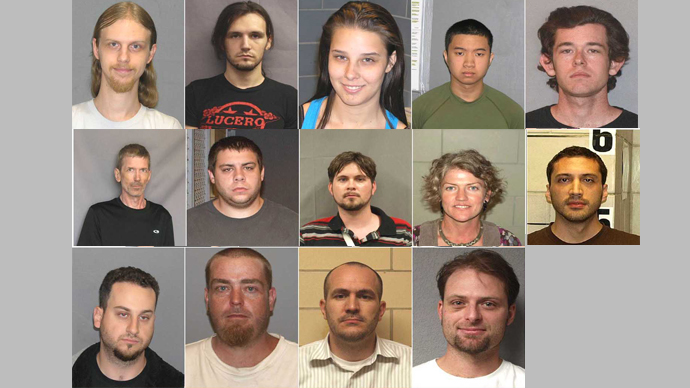
WikiLeaks spokesman Kristinn Hraffnsen was careful to distance his team from the hackers, but also welcomed the public show of support from like-minded groups who were outraged by constant corporate and government attacks on WikiLeaks. Julian Assange’s lawyer Jennifer Robinson was obliged to deny claims that he had encouraged the DDoS attacks on behalf of WikiLeaks.
“He did not make any such instruction, and indeed he sees that as a deliberate attempt to conflate hacking organizations with WikiLeaks, which is not a hacking organization.”
Similarly, while many #Anonymous groups expressed support for WikiLeaks, some "anons" maintained reservations about supporting Assange personally with the Swedish sex allegations still hanging over his head. Of course, the FBI was already working hard to infiltrate these hacker teams, divide opinions, and manipulate decision-making.
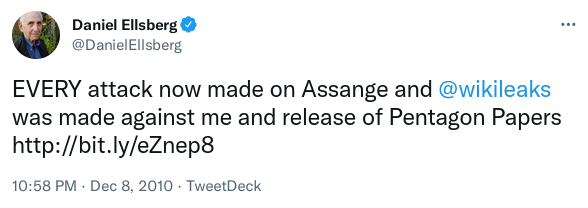
While all the above drama was unfolding, Julian Assange was staying at the London home of esteemed UK human rights lawyer Geoffrey Robertson and his Australian wife Kathy Lette. Assange was deeply concerned by the constant death threats he was receiving from high profile public figures, but also carefully deliberating with his lawyers on how best to respond to Sweden’s shocking new European Arrest Warrant.
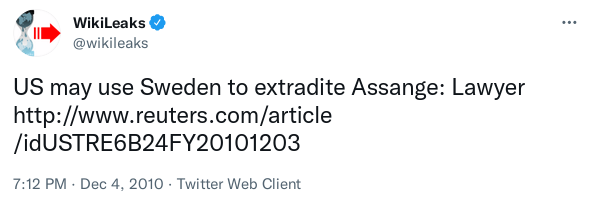
On 5 December 2010 Assange’s lawyers revealed that they had been watched by people parked outside their houses for the past week. Jennifer Robinson told ABC News they still hadn’t even seen a copy of the arrest warrant.
"What we know is that an arrest warrant was issued about two weeks ago, communicated to the UK authorities, and it was sent back on the grounds that there was an administrative error. I am still trying to seek confirmation of what that was.
Despite writing to Europol, Interpol, and British authorities, none of the "various arrest warrants" were provided to them. Assange’s lawyers said they were not provided with any evidence from Sweden or even an allegation in English.
“It is highly irregular. In fact it’s bizarre.”
Robinson also noted that the US State Department was intentionally intimidating her by conflating client and lawyer names in correspondence:
The letter, which was released to the press, begins: "Dear Ms Robinson and Mr Assange. I am writing in response to your 26 November 2010 letter to US Ambassador Louis B Susman regarding your intention to again publish on your WikiLeaks site what you claim to be classified US government documents." Robinson said: "By eliding client and lawyer, that was a very inappropriate attempt to implicate me. That is really inappropriate to come from the State Department of all places; they understand very well the rules on attorney-client protocol."
Assange’s lawyers were negotiating a date for him to appear before a court and negotiate bail. Publicly, they refused to even confirm that the WikiLeaks founder was still in Britain. But after media reported that he was "in hiding", Kristinn Hrafnsson explained: “he is not in hiding, the authorities here, the police know where he is." The Guardian reported that Assange was "seeking supporters to put up surety" and "expected to have to post bail of between £100,000 and £200,000".
Before heading to court, however, Julian Assange did a live Q and A session on the Guardian website, which almost collapsed due to the huge number of online visitors.
First question: did Assange want to return to Australia?
I am an Australian citizen and I miss my country a great deal. However, during the last weeks the Australian prime minister, Julia Gillard, and the attorney general, Robert McClelland, have made it clear that not only is my return is impossible but that they are actively working to assist the United States government in its attacks on myself and our people. This brings into question what does it mean to be an Australian citizen - does that mean anything at all? Or are we all to be treated like David Hicks at the first possible opportunity merely so that Australian politicians and diplomats can be invited to the best US embassy cocktail parties.
Are you a journalist?
I coauthored my first nonfiction book by the time I was 25. I have been involved in nonfiction documentaries, newspapers, TV and internet since that time. However, it is not necessary to debate whether I am a journalist, or how our people mysteriously are alleged to cease to be journalists when they start writing for our organisaiton. Although I still write, research and investigate my role is primarily that of a publisher and editor-in-chief who organises and directs other journalists.
Is the game that you are caught up in winnable?
The Cable Gate archive has been spread, along with significant material from the US and other countries to over 100,000 people in encrypted form. If something happens to us, the key parts will be released automatically. Further, the Cable Gate archives is in the hands of multiple news organisations. History will win. The world will be elevated to a better place. Will we survive? That depends on you.
Assange answered over a dozen other questions ranging from redactions and Chelsea Manning to future leaks and UFOs.
An updated European Arrest Warrant with "requested additional information" from Sweden was received by London police on the evening of 6 December 2010. The next day, Julian Assange attended the City of Westminster Magistrates Court, accompanied by lawyers and officials from the Australian High Commission.
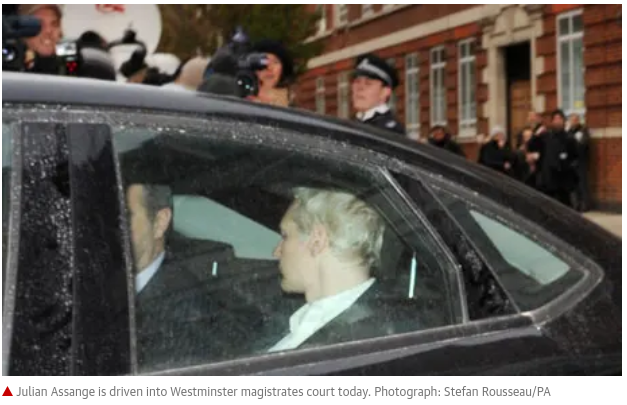
Asked if he consented to be extradited to Sweden, Assange replied that he did not consent and would file an appeal.
Journalist John Pilger, filmmaker Ken Loach, and socialite Jemima Khan were among six people in court willing to offer surety. They all offered at least £20,000 each. An anonymous individual offered £60,000.
But there was "audible dismay" in the court when the judge refused bail. He claimed these were "serious allegations against someone who has comparatively weak community ties in this country and the means and ability to abscond". The judge also stated, for the benefit of anyone in doubt:
"This case is not about WikiLeaks."
Spontaneous applause erupted in the courtroom as Assange was lead away. He was remanded in custody and his passport was seized. He was then transported to Wandsworth Prison in south London and placed in solitary confinement.
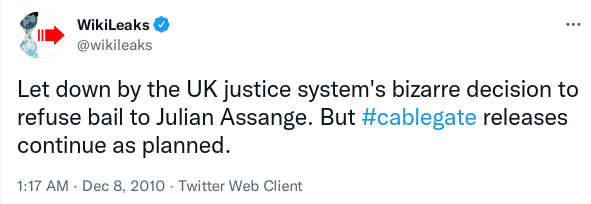
*
On the same day that Julian Assange was jailed, 7 December 2010, US officials confirmed to the Australian embassy in Washington that the Justice Department was conducting an "active and vigorous inquiry into whether Julian Assange can be charged under US law, most likely the 1917 Espionage Act". They said: "the WikiLeaks case is unprecedented both in its scale and nature". Two weeks later the embassy advised Canberra that media reports of a secret WikiLeaks grand jury were "likely true". In spite of this, Australian government officials publicly pretended for over eight years that Assange’s extradition case was just about the Swedish sex allegations.
On the following day, 8 December 2010, the UK Independent revealed that informal discussions had already taken place between US and Swedish officials over the possibility of Assange being delivered into US custody. Anonymous diplomatic sources indicated that the USA had agreed not to reveal charges, prompting an extradition request, until "after legal proceedings are concluded in Sweden".
"Sources stressed that no extradition request would be submitted until and unless the US government laid charges against Mr Assange, and that attempts to take him to America would only take place after legal proceedings are concluded in Sweden."
One of the two prosecutors attached to the WikiLeaks Grand Jury was US attorney Neil McBride, who made a name for himself in the wake of the 2001 terror attacks by demanding extraterritorial applications of US criminal law.
“Criminals today aren’t confined by borders and neither are we.”
This approach aligned neatly with the dominant US Neoconservative view that, with the end of the Cold War, the USA was now the sole superpower and thus "the American Century" was just beginning. MacBride was nominated by President Obama to run the Eastern District jurisdiction, which is home to both the Pentagon and the CIA and handles most US "national security" cases, until he was forced to resign from his "dream job" in 2013. In addition to WikiLeak, MacBride was involved in prosecuting National Security Agency whistleblower Edward Snowden and the Megaupload file-sharing site’s German founder Kim Dotcom.
Senator Joe Lieberman was also keen to expand existing laws. On 2 December 2010, he announced a plan to amend the 1917 Espionage Act in order “to go after Wikileaks and its founder Julian Assange.” John Ensign (who resigned 6 months later due to a sex scandal) was one of two Republican Senators who co-signed the bipartisan plan.
“Julian Assange and his cronies, in their effort to hinder our war efforts, are creating a hit list for our enemies by publishing the names of our human intelligence sources,” said Ensign. “Our sources are bravely risking their lives when they stand up against the tyranny of al-Qaeda, the Taliban and murderous regimes, and I simply will not stand idly by as they become death targets because of Julian Assange. Let me be very clear, WikiLeaks is not a whistleblower website and Assange is not a journalist.”
The argument that Assange was not a journalist was widely repeated in the media, implicitly suggesting that the Australian would not receive US First Amendment protections if he was charged under US law.
The CIA meanwhile set up a new "WikiLeaks Task Force", whose official acronym W.T.F. was met with much mirth by WikiLeaks supporters. And the Daily Beast reported that the Obama administration was planning "a major reshuffling of diplomats, military officers, and intelligence operatives at US embassies around the world out of concern that WikiLeaks has made it impossible — if not dangerous — for many of the Americans to remain in their current posts”.
Journalists who worked with WikiLeaks were also under growing pressure as stories continued appearing. The editors of El Pais wrote a strong editorial defending their decision to publish the cables:
The publication of the diplomatic cables has stirred international opinion and surprised some governments, who often adduce false arguments to downplay or discredit this news bomb. The security of individual sources has been assured by eliminating names and data that might endanger them, as the reader will have noticed. The media that have published the revelations have acted within the limits sketched out by the US Supreme Court in the Pentagon Papers case, opting for freedom of information and the citizen’s right to know. As for the relevance of the information, the pages of this newspaper speak for themselves.
There is no historical precedent for this in term of scope, as it affects so many conflicts throughout the world. The revelations show a seamy side of the political world, about which we all had well-grounded suspicions, but no clear certainty. We are, in a sense, freer now than we were before, which is as much as journalism can hope to achieve.
Meanwhile, US Air Force staff and other US government employees were blocked from accessing the news websites of El Pais, the Guardian, the New York Times or other news organisations reporting on the WikiLeaks cables. The Wall Street Journal reported on 15 December 2010 that at least 25 sites were barred. Staff who attempted to access them received an on-screen message: "Access denied. Internet usage is logged and monitored."
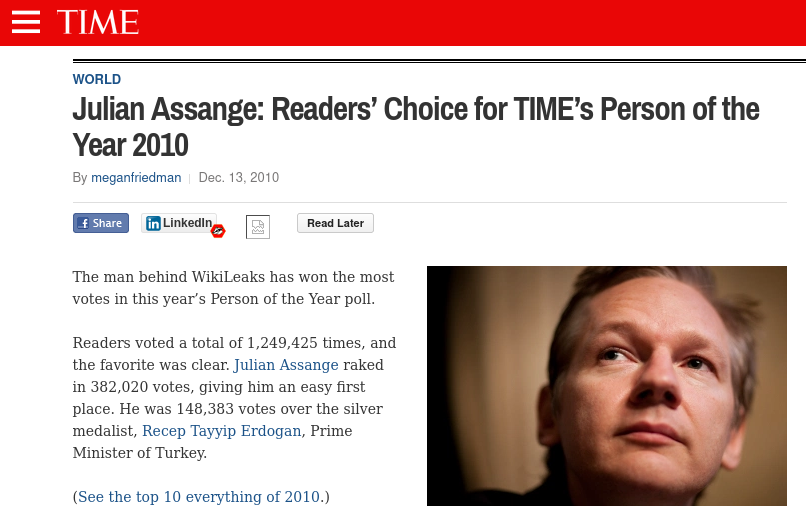
Despite all these attacks, TIME magazine argued that WikiLeaks was winning the "asymmetric info war" and Assange’s arrest was "a win, not a loss, for his organization". The more brutally the US government cracked down on WikiLeaks, the more public support the organisation achieved.
*
On 14 December 2010 Julian Assange’s mother Christine gave Australian media a written statement from her son after visiting him in jail:
"My convictions are unfaltering. I remain true to the ideals I have expressed… This circumstance shall not shake them. If anything, this process has increased my determination that they are true and correct," he wrote.
Julian Assange was released from jail two days later after supporters posted a massive £200,000 bail. He addressed a huge gathering of supporters and flashbulb-popping journalists outside London’s Royal Courts of Justice.
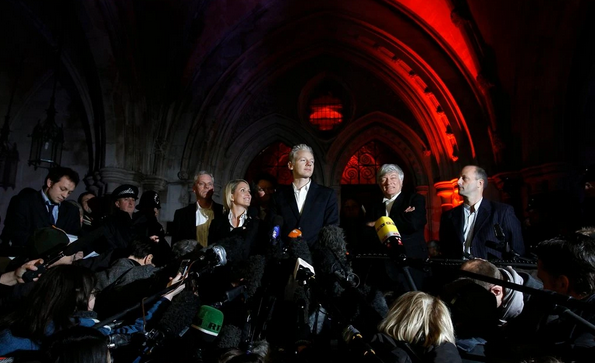
“Well, it’s great to feel the fresh air of London again,” he told the cheering crowd. “I have enough anger to last me 100 years, but I will channel that into my work… I don’t have too many fears about being extradited to Sweden. There are much bigger concerns about being extradited to the United States… I hope to continue my work and continue protesting my innocence in this matter.”
Assange described his conditions in jail as “solitary confinement in the bottom of a Victorian prison.”
Despite granting bail, the UK High Court ruled that Assange would have to wear an electronic ankle tag, abide by a curfew from 10 pm to 8 am, and report daily to the local police station. His passport was not returned.
In granting bail [the judge] stipulated that two of Mr. Assange’s closest WikiLeaks associates, Joseph Farrell and Sarah Harrison, were required to add financial guarantees to those from the prominent people who had vouched for Mr. Assange.
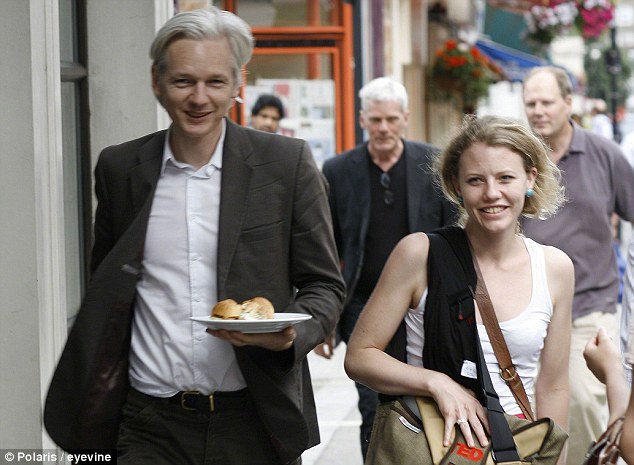
- NOTE
-
Assange was now frequently photographed by the media in the company of Sarah Harrison, who modestly described herself as "just a blonde girl" with "the most boring name ever”. Harrison had joined WikiLeaks to help with the Afghan War Diaries after previously working as an investigative researcher for The Bureau of Investigative Journalism and the Centre for Investigative Journalism.
The WikiLeaks founder was effectively placed under house arrest at a 10-bedroom Norfolk mansion named Ellingham Hall, which was owned by Vaughan Smith, the founder of the Frontline Club for journalists.
The supposedly left-wing Guardian newspaper had a noticably odd take on these court proceedings. Luke Harding and Sam Jones claimed that "it was the maverick British establishment that rode to the rescue of Julian Assange, offering to whisk him from dull confinement in Wandsworth jail to a large and comfy manor house".
For once, Assange was not the star at the afternoon bail hearing at Westminster magistrates' court… Instead the hero was Vaughan Smith, a former army officer, journalist adventurer and rightwing libertarian.
They said Assange could look forward to "pheasant dinners, port and brisk walks around the estate" but "according to friends, Assange shows little interest in food, and is invariably late for meals."
By contrast, Vaughan Smith told the court Assange was "a very honourable person, hugely clever, self-deprecatory and warm. Not the kind of things you read about."
*
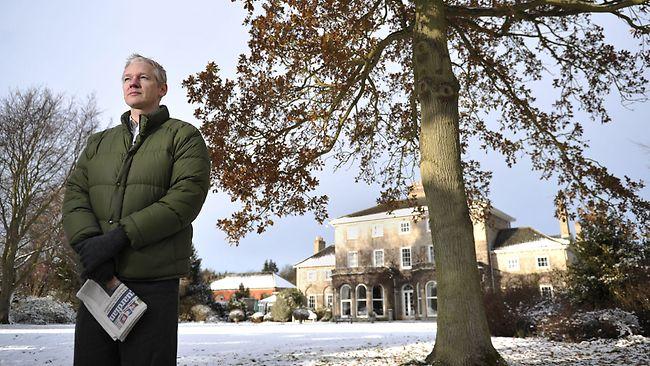
Speaking to journalists outside Ellingham Hall the next day, Assange said the threat of onwards extradition to the United States "seems to be increasingly serious and increasingly likely."
Unbeknownst to Assange, two new prongs of attack were already underway. Firstly the US government was demanding the private Twitter account details of WikiLeaks insiders. And the Bank of America, which was rumoured to be the target of WikiLeaks' next big release, had contracted private security companies to go after the whistle-blowing site.
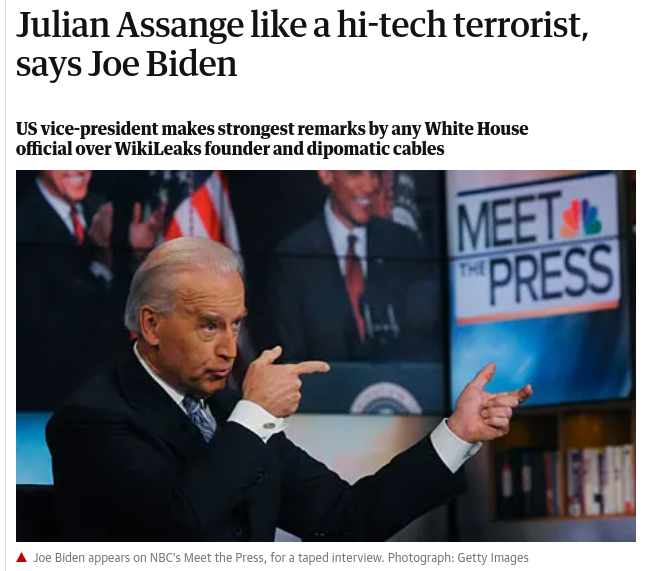
A day later, on 18 December 2010, US vice-president Joe Biden was asked about Assange on NBC’s Meet the Press.
Asked if he saw Assange as closer to a hi-tech terrorist than the whistleblower who released the Pentagon papers in the 1970s, which disclosed the lie on which US involvement in Vietnam was based, Biden replied: "I would argue it is closer to being a hi-tech terrorist than the Pentagon papers".
On the previous day, Biden had said "I don’t think there’s any substantive damage" from the WikiLeaks publications. Now he walked that back:
"He’s made it more difficult for us to conduct our business with our allies and our friends. For example, in my meetings – you know I meet with most of these world leaders – there is a desire now to meet with me alone, rather than have staff in the room. It makes things more cumbersome – so it has done damage."
Meanwhile a new Rap News video had dropped:
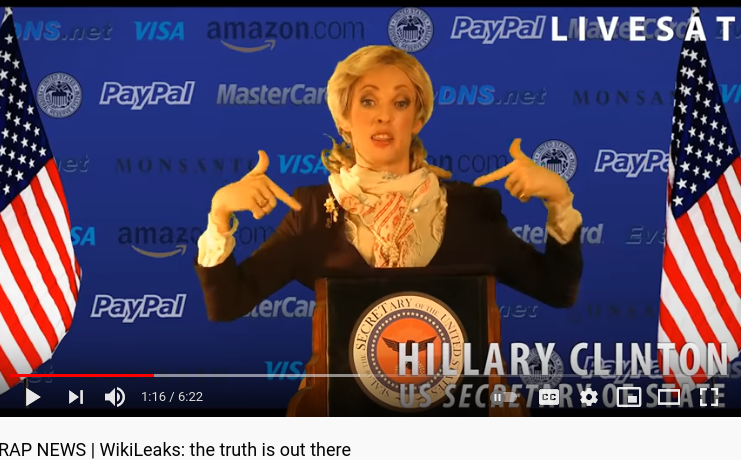
Is WikiLeaks really the greatest threat that we face? Or is it the response we are seeing in defence of the state? A response that is building and seeks To turn back the clock on freedom of speech And fundamental rights earned over a century. This should ring alarm bells for all who know their history... History books will be written about events this month: The story they will tell is up to us.
*
*
The author of this book can be found on Twitter: @Jaraparilla
*
Home - Genesis - 2007 - 2008 - 2009 - Early 2010 - Mid 2010 - Late 2010 - End 2010 - Early 2011 - Mid 2011 - Late 2011 - End 2011 - Early 2012 - Late 2012 - Early 2013- Late 2013 - 2014 - 2015 - Early 2016 - Late 2016 - 2017-19
Copyright Gary Lord 2021, 2022, 2023